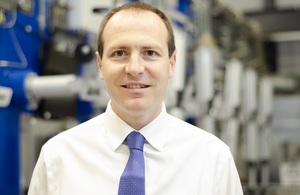Fusion energy leader wins prestigious physics medal
Professor Ian Chapman, UK Atomic Energy Authority’s CEO, has today been awarded the Institute of Physics’ prestigious Richard Glazebrook Medal 2021 for his exceptional leadership in fusion technology and the field of physics.
The Institute of Physics (IOP) is the professional body and learned society for physics, and the leading body for practising physicists in the UK and Ireland. Its annual awards proudly reflect the wide variety of people, places, organisations and achievements that make physics such an exciting discipline.
Prof. Chapman received his award for outstanding leadership of UKAEA, the world’s foremost fusion energy research and technology organisation, and for the progress it has delivered in plasma physics, deuterium-tritium experiments, robotics, and new materials.
Prof. Chapman said: “I’m honoured to receive this award on behalf of all the team at UK Atomic Energy Authority. Realising fusion energy is one of the biggest scientific and engineering grand challenges, but the rewards for success would be massive.
“We all know we must address the effects of climate change, and fusion offers so much potential. Ensuring a low-carbon, low-land use, sustainable source of energy to satisfy a growing global population is what drives me every day, and I wouldn’t be here leading such a talented team if I didn’t think we could find the solutions we need.”
Fusion energy has been one of science and engineering’s biggest challenges. Teams around the world are working intensely to solve these challenges, with UKAEA providing many unique contributions. Plans are well advanced for its prototype fusion power plant (STEP, the Spherical Tokamak for Energy Production), set to be completed in the early 2040s.
Congratulating this year’s award winners, Institute of Physics President, Professor Sheila Rowan, said: “On behalf of the Institute of Physics, I warmly congratulate all of this year’s award winners. Each and every one of them has made a significant and positive impact in their profession, whether as a researcher, teacher, industrialist, technician or apprentice.
“Recent events have underlined the absolute necessity to encourage and reward our scientists and those who teach and encourage future generations. We rely on their dedication and innovation to improve many aspects of the lives of individuals and of our wider society.”

